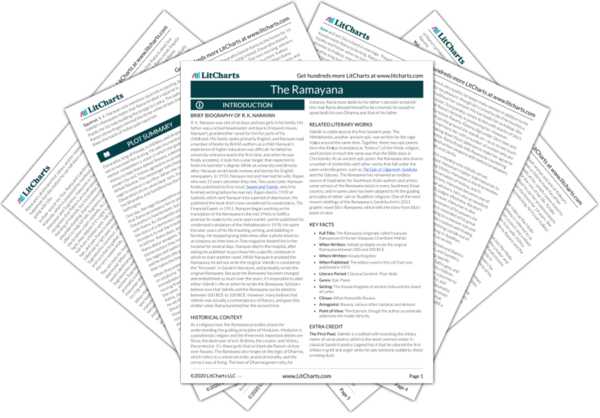Ravana Quotes in The Ramayana
Ravana can be destroyed only by a human being since he never asked for protection from a human being.

Unlock explanations and citation info for this and every other The Ramayana quote.
Plus so much more...
Get LitCharts A+Rama's whole purpose of incarnation was ultimately to destroy Ravana, the chief of the asuras, abolish fear from the hearts of men and gods, and establish peace, gentleness, and justice in the world.
The kings of this earth whom he had reduced to vassal-dom stood about with their hands upraised in an attitude of perpetual salutation, lest at any moment Ravana should turn in their direction and think that they were not sufficiently servile.
"You are the overlord of seven worlds, mightier than the mightiest. Why do you feel sad and unhappy? Go and get her; that is all. Take her. She is yours. Is there anything beyond your reach? Stir yourself. Leave this desolate mood. Go forth, snatch her, because she is yours, created for you and waiting for you."
"You have done incompatible things. You have desired to appropriate another man's wife, which is against all codes of conduct, and now you are thinking of your prestige, reputation, fame, might, and eminence."
"Is there anyone who has conquered the gods and lived continuously in that victory? Sooner or later retribution has always come."
Rama at once invoked a weapon called "Gnana"—which means "wisdom" or "perception."
While he had prayed for indestructibility of his several heads and arms, he had forgotten to strengthen his heart, where the Brahmasthra entered and ended his career.
The gods, who had watched this in suspense, were now profoundly relieved but also had an uneasy feeling that Rama had, perhaps, lost sight of his own identity. Again and again this seemed to happen. Rama displayed the tribulations and the limitations of the human frame and it was necessary from time to time to remind him of his divinity.

Ravana Quotes in The Ramayana
Ravana can be destroyed only by a human being since he never asked for protection from a human being.

Unlock explanations and citation info for this and every other The Ramayana quote.
Plus so much more...
Get LitCharts A+Rama's whole purpose of incarnation was ultimately to destroy Ravana, the chief of the asuras, abolish fear from the hearts of men and gods, and establish peace, gentleness, and justice in the world.
The kings of this earth whom he had reduced to vassal-dom stood about with their hands upraised in an attitude of perpetual salutation, lest at any moment Ravana should turn in their direction and think that they were not sufficiently servile.
"You are the overlord of seven worlds, mightier than the mightiest. Why do you feel sad and unhappy? Go and get her; that is all. Take her. She is yours. Is there anything beyond your reach? Stir yourself. Leave this desolate mood. Go forth, snatch her, because she is yours, created for you and waiting for you."
"You have done incompatible things. You have desired to appropriate another man's wife, which is against all codes of conduct, and now you are thinking of your prestige, reputation, fame, might, and eminence."
"Is there anyone who has conquered the gods and lived continuously in that victory? Sooner or later retribution has always come."
Rama at once invoked a weapon called "Gnana"—which means "wisdom" or "perception."
While he had prayed for indestructibility of his several heads and arms, he had forgotten to strengthen his heart, where the Brahmasthra entered and ended his career.
The gods, who had watched this in suspense, were now profoundly relieved but also had an uneasy feeling that Rama had, perhaps, lost sight of his own identity. Again and again this seemed to happen. Rama displayed the tribulations and the limitations of the human frame and it was necessary from time to time to remind him of his divinity.











